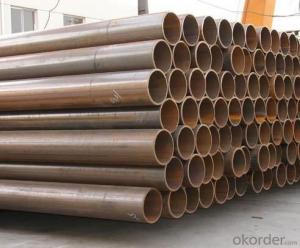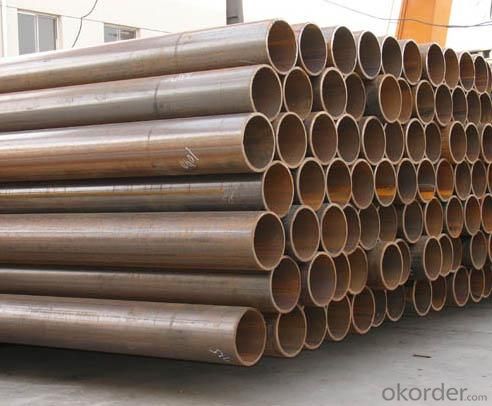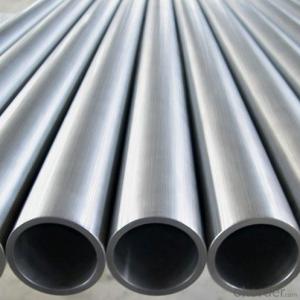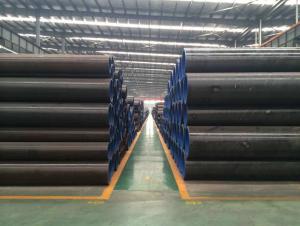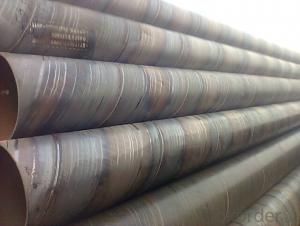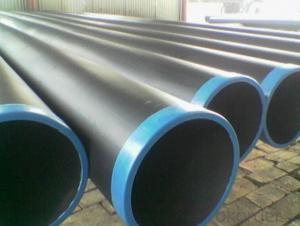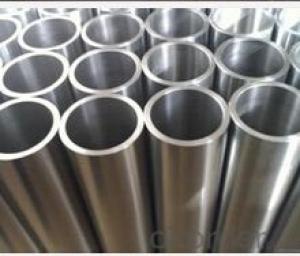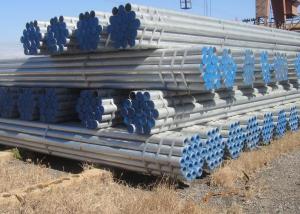Spiral Submerged Arc Welded Steel Pipe Oil Gas
- Loading Port:
- Tianjin
- Payment Terms:
- TT OR LC
- Min Order Qty:
- 30 m.t.
- Supply Capability:
- 8500 m.t./month
OKorder Service Pledge
OKorder Financial Service
You Might Also Like
1、Spiral Submerged Arc Welded Steel Pipe GB9711.2:
GB9711.2 Spiral Submerged Arc Welded Steel Pipe is electric resistance welding, the abbreviation for Oil for transporting oil and natural gas vapor liquid objects, can meet the requirements of high and low pressure, the transport in the world with pipe sector accounted for a pivotal position.
2、Main Features of Welded Black Spiral Submerged Arc Welded SteelPipe GB9711.2:
• High manufacturing accuracy
• High strength
• Good visual effect
• Reasonable price
• Small inertia resistance
• Strong heat dissipation ability
3、Welded Black Spiral Submerged Arc Welded SteelPipe Specification GB9711.2:
Standard | GB, DIN, ASTM ASTM A106-2006, ASTM A53-2007 |
Grade | 10#-45#, 16Mn 10#, 20#, 45#, 16Mn |
Thickness | 1 - 33 mm |
Section Shape | Round |
Outer Diameter | 21 - 610mm |
Place of Origin | Tianjin, China (Mainland) |
Secondary Or Not | Non-secondary |
Application | Hydraulic Pipe |
Technique | Cold Drawn |
Certification | API |
Surface Treatment | factory state or painted black |
Special Pipe | API Pipe |
Alloy Or Not | Non-alloy |
Length | 5-12M |
Outer Diameter | 21.3-610mm |
Grade | 20#, 45#, Q345, API J55, API K55, API L80, API N80, API P110, A53B |
Standard | ASME, ASTM |
1) Material:20#(ASTM A 106/A53 GRB.API5LGRB,GB),45#,16Mn,10#.
2) Specification range:OD:21.3-610mm,WT:6-70mm,length:6-12m or according to the requirement of clients.
3) Excutive standards:GB,ASME API5L.ASTM A 106/A53,Despite of the above standards,we can also supply seamless steel pipe with standard of DIN,JIS,and so on,and also develop new products according to the requirements of our clients!
4) Surface:black lacquered,varnish coating or galvanized.
5) Ends:Beveled or square cut,plastic capped,painted.
6) Packing:bundles wrapped with strong steel strip,seaworthy packing.
4、Packaging & Delivery
Packaging Details: | seaworthy package,bundles wrapped with strong steel strip |
Delivery Detail: | 15-30days after received 30%TT |
5、FAQ of Welded Black Spiral Submerged Arc Welded SteelPipe GB9711.2:
①How is the quality of your products?
Our products are manufactured strictly according to national and internaional standard, and we take a test
on every pipe before delivered out. If you want see our quality certifications and all kinds of testing report, please just ask us for it.
Guaranteed: If products’ quality don’t accord to discription as we give or the promise before you place order, we promise 100% refund.
②How about price?
Yes, we are factory and be able to give you lowest price below market one, and we have a policy that “ for saving time and absolutely honest business attitude, we quote as lowest as possible for any customer, and discount can be given according to quantity”,if you like bargain and factory price is not low enough as you think, just don’t waste your time.Please trust the quotation we would give you, it is professional one.
③Why should you chose us?
Chose happens because of quality, then price, We can give you both.Additionally, we can also offer professional products inquiry, products knowledge train(for agents), smooth goods delivery, exellent customer solution proposals.Our service formula: good quality+good price+good service=customer’s trust
SGS test is available, customer inspection before shipping is welcome, third party inspection is no problem.
6、 Welded Black Spiral Submerged Arc Welded SteelPipe Images GB9711.2:
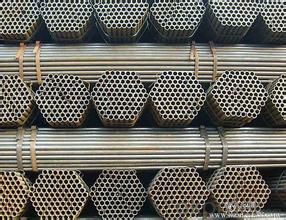
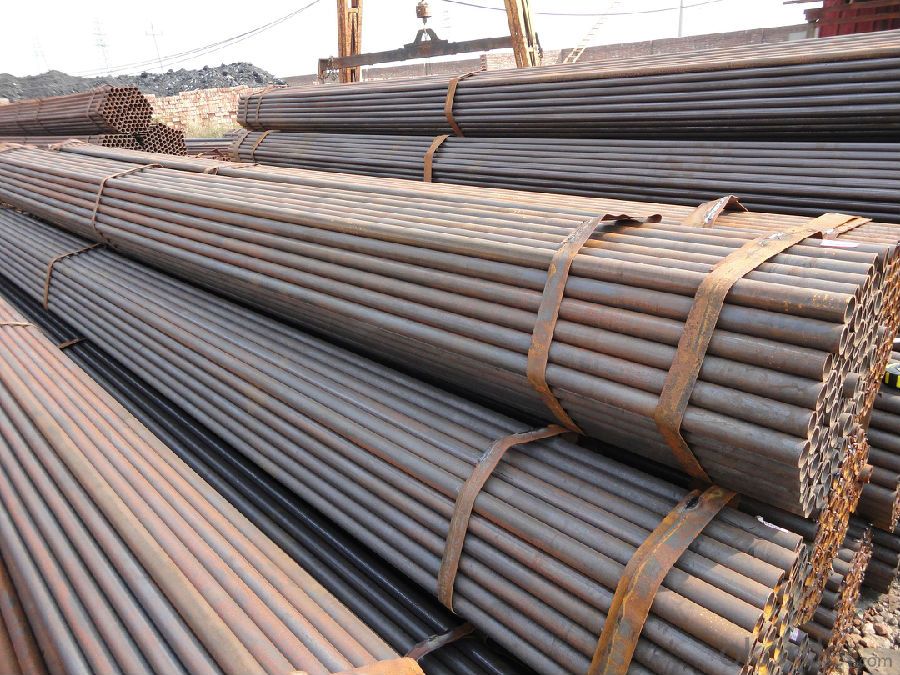
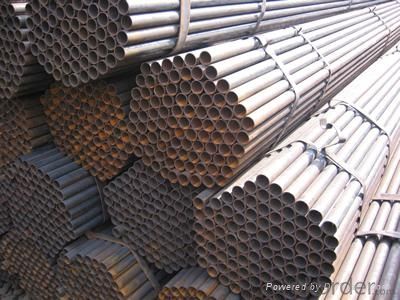
- Q: What are the safety regulations for working with steel pipes?
- The safety regulations for working with steel pipes typically include wearing appropriate personal protective equipment (PPE), such as gloves, safety glasses, and steel-toed boots, to prevent injuries. Workers should also receive training on proper handling and lifting techniques to avoid strains and sprains. Additionally, the use of proper tools and equipment, such as pipe cutters and clamps, is essential for safe operations. It is important to follow procedures for securing pipes to prevent them from rolling or falling. Finally, workers should be aware of potential hazards, such as sharp edges and hot surfaces, and practice good housekeeping to minimize slips, trips, and falls.
- Q: Can steel pipes be used for oil drilling operations?
- Yes, steel pipes are commonly used for oil drilling operations due to their strength, durability, and ability to withstand high pressure and corrosive environments.
- Q: Can steel pipes be used for wastewater disposal?
- Indeed, wastewater disposal can be accomplished using steel pipes. Owing to their robustness, strength, and corrosion resistance, steel pipes find widespread application in wastewater systems. They are capable of withstanding the substantial pressure and flow rates commonly encountered in wastewater scenarios, efficiently conveying it to treatment plants or other disposal sites. Moreover, steel pipes can be enhanced with coatings or linings that offer additional safeguard against corrosion or chemical reactions with the wastewater, further enhancing their durability and efficacy in wastewater disposal.
- Q: What are the different types of steel pipe joints for underwater applications?
- There are various types of steel pipe joints commonly used for underwater applications, including buttweld joints, socket weld joints, and threaded joints. These joints provide secure connections and maintain the integrity of the pipeline system in underwater environments.
- Q: How are steel pipes used in wastewater treatment plants?
- Steel pipes are extensively used in wastewater treatment plants for various purposes such as transporting wastewater, carrying chemicals, and supporting infrastructure. These pipes are durable, corrosion-resistant, and can withstand high pressure, making them ideal for conveying wastewater and other fluids within the plant. Additionally, steel pipes are often used in the construction of wastewater treatment plant structures and support systems due to their strength and longevity.
- Q: What is the fatigue strength of steel pipes?
- The ability of steel pipes to withstand repeated cyclic loading without failing is referred to as their fatigue strength. This characteristic is of utmost importance for pipes that experience dynamic or fluctuating loads, such as those used in the oil and gas industry, transportation infrastructure, or industrial applications. Several factors can affect the fatigue strength of steel pipes, including the grade of steel, dimensions of the pipe, manufacturing process, surface conditions, and environmental factors. Generally, steel pipes with higher tensile strength and toughness exhibit better resistance to fatigue. Fatigue strength is typically determined by subjecting the pipes to cyclic loading until failure occurs, through a process known as fatigue testing. The results of these tests are then used to establish a fatigue curve or S-N curve, which illustrates the relationship between the applied stress amplitude and the number of cycles required for failure. To quantify the fatigue strength, it is common to express it as the stress amplitude required to cause failure after a specific number of cycles, such as the stress amplitude at 10 million cycles (S-N10^7). However, it is important to consider other factors such as mean stress, surface finish, and loading frequency, which can also influence fatigue strength and may require consideration in specific applications. Ultimately, the fatigue strength of steel pipes is a crucial factor in engineering design and maintenance, as it ensures the long-term integrity and reliability of the pipes under cyclic loading conditions.
- Q: Which is better, galvanized steel pipe or stainless steel?
- In rural and urban areas, it is often necessary to wash them in order to keep them in the open. In the heavily polluted industrial and coastal areas, the surface can be very dirty and even rust. But to obtain the aesthetic effect of outdoor environment, it is necessary to use nickel stainless steel. Therefore, 304 stainless steel is widely used in curtain walls, side walls, roofs and other building applications, but in corrosive industrial or marine atmospheres, it is better to use 316 stainless steel. There are several design criteria including 304 and 316 stainless steel.
- Q: Can steel pipes be used for hydraulic systems?
- Yes, steel pipes can be used for hydraulic systems. Steel pipes are commonly used in hydraulic systems due to their high strength, durability, and resistance to high pressure and temperature. They provide reliable performance and are suitable for a wide range of hydraulic applications.
- Q: What is the role of steel pipes in the transportation of water?
- The role of steel pipes in the transportation of water is to provide a durable and reliable infrastructure for the safe and efficient conveyance of water from its source to various destinations. Steel pipes are known for their strength, corrosion resistance, and ability to withstand high pressure, making them ideal for water transportation systems. These pipes ensure that water is delivered to homes, businesses, and other locations, while maintaining its quality and preventing leaks or contamination.
- Q: How do steel pipes handle thermal expansion?
- Steel pipes handle thermal expansion by expanding and contracting with changes in temperature. The high thermal conductivity of steel allows it to transfer heat quickly, preventing excessive expansion. Additionally, the flexibility of steel allows it to absorb the expansion and contraction without compromising the integrity of the pipe.
Send your message to us
Spiral Submerged Arc Welded Steel Pipe Oil Gas
- Loading Port:
- Tianjin
- Payment Terms:
- TT OR LC
- Min Order Qty:
- 30 m.t.
- Supply Capability:
- 8500 m.t./month
OKorder Service Pledge
OKorder Financial Service
Similar products
Hot products
Hot Searches
Related keywords
